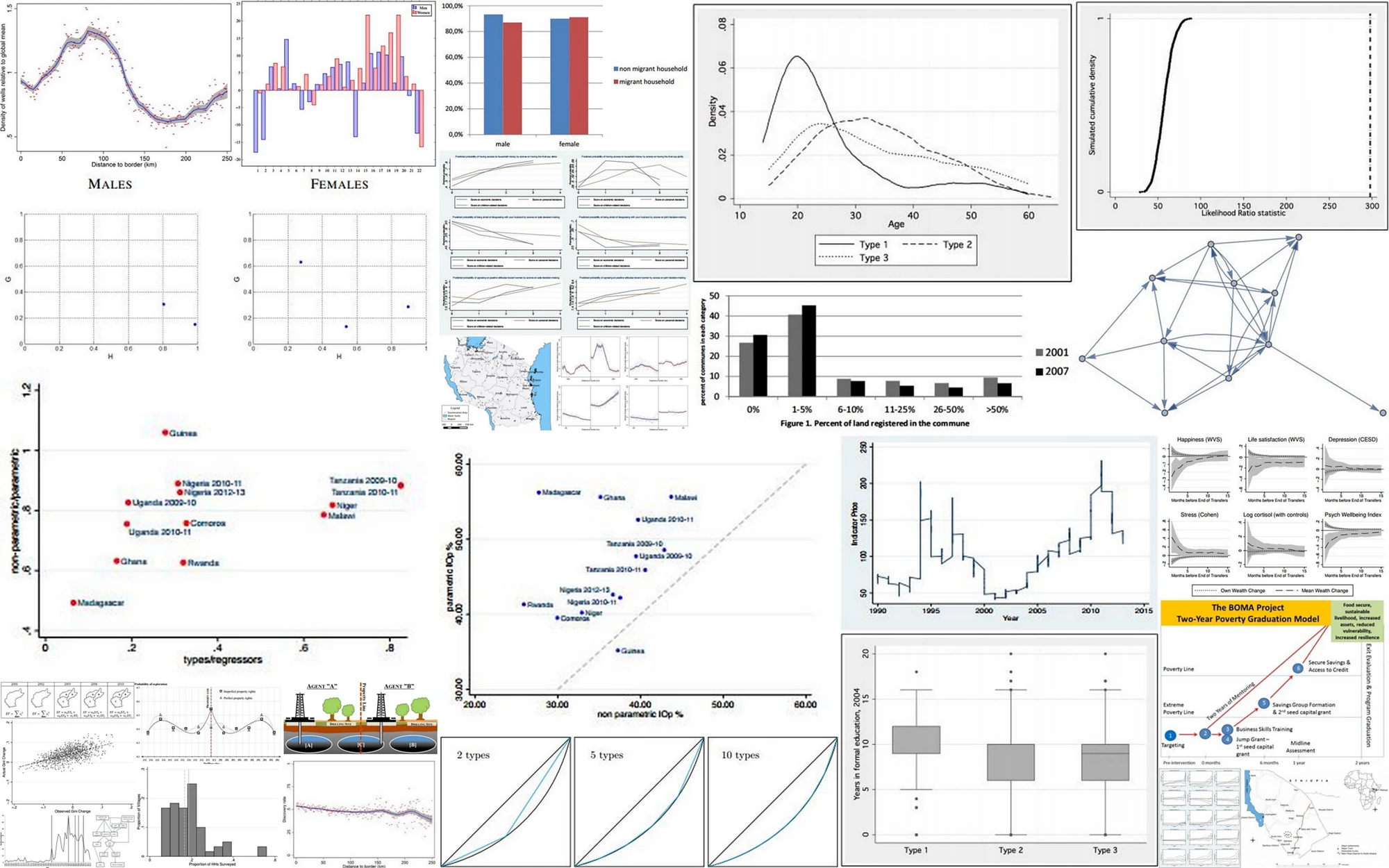
This post is a joint production with contributions from Pamela Jakiela, João Montalvão, Michael O’Sullivan, Owen Ozier, and Anna Popova.
The last two days of CSAE 2016 included a host of additional papers, as well as a lively plenary on Industrializing Africa, with presentations from Adrian Wood (“Industrialising Africa in Global Perspective”), Margaret McMillan (“The Role of Domestic and Regional Markets in African Manufacturing”), Helen Hai (“Would Africa become the next Manufacturing Floor of the world?”), and Nebil Kellow (“Green industrialisation in Ethiopia”).
As with Tuesday’s post, below are micro-summaries of many of the papers presented. These posts focus on applied micro papers, and they are not nearly exhaustive. If your paper isn’t listed, feel free to give a one-line summary with a link in the comments!
You can skip down to summaries of papers on agriculture, credit, savings, and insurance, education, firms, health, household and social networks, institutions, labor, migration, natural resources, political economy, and poverty and inequality.
Agriculture
- Investments in health and – for land-poor households – education can yield positive impacts on agricultural productivity #BurkinaFaso #IV (Wouterse)
- Households report much higher farm labor estimates in end-of-season surveys, when compared with high-frequency surveys – a recall bias with implications for productivity measurement #Tanzania #RCT (Arthi et al.)
- Landslides in #Uganda lead to drops in household income, with off-farm work used as a short-term coping strategy (Mertens et al.)
- Cereal biodiversity positively affects output but the relationship varies across regions in #Ethiopia, with likely limited potential for long-term output growth (Fontes & Groom)
- Self-efficacy predicts adoption of a climate smart technology in #Ghana, specially so among farmers previously more exposed to droughts. #IV (Wuepper)
- More risk averse and patient farmers more likely to adopt preventive treatment against a widespread livestock disease in #West Africa. #LIF (Liebenehm)
- Export quality premiums in #Ethiopia’s coffee sector are small and only one-third is passed on to producers. (Minten et al.)
- Women farmers with higher non-cognitive entrepreneurial ability more likely to grow cash crops in #Malawi, especially so when cultural institutions are stacked against them. (Frese et al.)
- Smallholder participation in outgrower schemes and wage labor in #Tanzania are both associated with increased household income and reduced poverty. (Herrmann)
- Population growth and access to urban markets relate strongly to farm mechanization patterns in northern #Ghana (Cossar)
- Farmers in #Ethiopia experience complementarities in the adoption of improved seed and fertilizer (Abay et al.)
- Subsidized access to improved seeds leads to sustained adoption, but also leads households to expand virgin land under cultivation #DRC #RCT (Bernard et al.)
- A massive rural roads scheme generates a shift out of agriculture and into labor markets in #India #RDD (Asher & Novosad)
- Low-cost rail transport reduces dispersion in agricultural commodity prices in #Malawi (Zant)
- The partition of #India – and the influx migrants with higher human capital – is associated with higher agricultural growth trajectories (Bharadwaj & Mirza)
- Providing information about market prices to smallholder coffee farmers increases profits and revenues. #Ethiopia (Lee & Suzuki)
- Climate change! There are non-linear effects of rainfall on food security: More rain is good, until it’s too much. #Kenya (Kabubo-Mariara et al.)
- Households that have been hit by previous droughts are less affected by current droughts (as long as they aren’t too big). #Tanzania (Skjeflo & Westberg)
Credit, Savings, & Insurance
- The effects of credit counseling for youth entrepreneurs can be amplified through social networks #Uganda #RCT (Baena)
- Fertility historically served as a risk-coping strategy for agricultural households in the #USA (Grimm)
- Providing a simple savings technology (lockboxes) and SMS reminders yields no effect on household ceremonial expenditure, but helps smoothing and resilience to health shocks #Niger #RCT (Aker et al.)
- Shopkeepers who provide interest-free store credit in rural #Yemen serve as informal insurance providers #RCT (Kurdi)
Education
- Formal school fees surely matter. But a bundled intervention – including alleviating informal fees – helps too. School enrollment up, but test scores down. #DiffInDiff #TheGambia (Giordono and Pugatch)
- Using #YoungLives data, no gender gap in cognition at age 5. It widens in adulthood. Males ahead in #India and #Ethiopia. Females in #Vietnam. Less pronounced in #Peru. (Singh and Krutikova)
- Combined performance incentives and capitation grants improve test scores more than separate effects summed. No effect of grants alone. #RCT #Tanzania (Mbiti et al.)
- In the cross-section, trained teachers appear to bring about better learning in their students. And in an experiment, trained teachers respond more effectively to performance incentives. #RCT #Rwanda (Leaver et al.)
- Land certification increases school enrollment but worsens grade progression for the oldest kid (the presumed inheritor) (Congdon Fors et al.) #Ethiopia #DiffInDiff
- A local language materials and sustained teacher training intervention massively improves letter recognition. But at the expense of some other skills. #RCT #Uganda (Kerwin and Thornton)
- What works in education? Teaching to student learning levels works, lots of different ways. And highly localized, individualized, and sustained teacher training. BTW: 1) Meta-analyses don’t even scrutinize overlapping papers. Authors can help by reporting program details *somewhere*, even if only in a web appendix. 2) Over-aggregation can be misleading. (David Evans blogged much of this story here.) (Evans and Popova)
- Adoption of mother tongue language instruction may improve educational outcomes in #Ethiopia (but there’s a lot going on simultaneously) #DiffInDiff (Seid)
Firms
- Family ownership has a negative causal impact on firm management practices in a broad sample of countries – firms are better off if the founder has no sons. #IV #WorldManagementSurvey (Lemos & Scur)
- Cash grants for female entrepreneurs are more effective when women are willing to hide money from their husbands. #RCT #Uganda (Fiala)
- Phone surveys work. Survey mode (phone vs. in-person interviews) does not impact responses in a survey of South African micro-enterprises. #RCT #SouthAfrica (Garlick et al.)
- Financial literacy training alone does nothing. But SMS reminders have effects! #RCT #Ethiopia (Abebe et al.)
Health
- “Psychotherapy for perinatally depressed mothers in rural Pakistan” led to big short-term impacts & significant effects 7 yrs later, especially for less supported mothers. #RCT (Baranov et al.)
- Trade – specifically AGOA – reduced infant mortality by 9% across Sub-Saharan Africa (Panda)
- Health budget decentralization of 5-10% in #Chad has reduced child malnutrition by 1.35% and increased the number of assisted childbirths by 0.25% working through an increase in female education and function health centers (Mallaye & Thierry)
- Adult men and children in #Senegal work more (or at all) in response to health shocks among household members of the opposite sex, but this does not affect school enrollment (Comblon & Marazyan)
- Access to legal and safe abortions in #Mexico City reduced fertility by 2.2-3.8% and maternal mortality by 11.8-23.1% (Clarke & Mühlrad) #DiffinDiff
- A sustainable intensification program in Northern #Ghana increased both production diversity and dietary diversity (Signorelli et al.)
- A 30 year cohort study of children in the #UK confirms the importance of infant feeding in reducing infant mortality but suggests initial deficits can be overcome through an improvement in access to nutrition and medical care (Schneider & Arthi)
- Panel data from North #Ethiopia shows children’s weight is vulnerable to seasonal fluctuations irrespective of their families’ proximity to local food markets (Abay)
- Living through a drought in early life causes short-term reductions in cognition and permanent stunting among children in #India (Ahmed)
- Incentivizing traditional birth attendants to encourage prenatal care makes pregnant women in rural #Kenya 20% more likely to receive the recommended number of antenatal care visits (Rai) #RCT
- Two-step stochastic frontier analysis shows administrative efficiency directly affects health facility and overall district performance in #Mozambique through the availability of staff and equipment (Anselmi et al.)
- Having access to health care facilities in rural #Ethiopia increases use of antenatal care by 13% but has no effect on demand for postnatal care or on pregnancy complications, suggesting a role for cultural norms (Manang)
Household & Social Networks
- Information (with and without economic incentives) reduces child marriage and increases women’s say at home. Downside? It might have increased acceptance of violence against women and polarized beliefs about child marriage. #Ethiopia #RCT (Chow and Vivalt)
- When ONE parent dies in middle childhood/adolescence the negative schooling, cognitive, and psychosocial impacts are short-term. But when BOTH parent die, consequences might be dire (but ultimately unknown). (Himaz)
- An analysis of peer effects on the decision to smoke tobacco and the intensity of smoking reveals “positive and significant peer effects…across all specifications.” #SouthAfrica (Mukong)
- More homogeneous social networks in #Ethiopia are better at monitoring members, less likely to stigmatize those with low social status, and better at insuring shocks. #FixedEffects (Abay & Berhane)
Institutions
- Does the end of levirate marriage (where a widow marries her late husband’s brother) empower women? Not necessarily. Panel data from #Tanzania suggests that consumption falls. (Kudo)
- Does anyone pay attention to the legal age of marriage? 10 to 20 pct of countries do, and (surprise!) they have better governance. #Discontinuities #GlobalDHSdata (Collin et al.)
Why does female genital mutilation persist in some countries and not others? More stable political regimes help change norms according to cross border analysis (Poyker) - “State power is extremely limited in isolated areas” of #Madagascar. (Bellemare et al.)
- Gift-exchange game in #Ghana finds employers do NOT punish low effort exertion by workers, resulting in shirking and often negative earnings for employers (Davies & Fafchamps) #Lab
- The wage gap between black and white, young and old, and more and less educated men in #SouthAfrica shrinks in the first year of employment as employer learning makes up for weak ex-ante productivity signals (Malindi)
- Interning improves both productivity and attitude among NGO workers in #Malawi through selection and incentive effects internship improve productivity by selection and attitude (Kim et al.) #RCT
- Interesting tool to look at differences in labor market trajectories and heterogeneity. Patterns of men and women in Germany and Ghana show differences in dynamism and gender. #Ghana (Falco et al.)
- Cool #RCT giving transport or workshop on how to apply for jobs in #Ethiopia. Both work, with long term employment up by 6 ppt for the workshop. Impacts higher for women and less educated. (Caria)
- Spillover effects of a job search assistance #RCT in #Ethiopia. Friends of those getting the assistance search less. (Witte)
- There have been major shifts in the economic base of urban centers in #Ethiopia over just four years (2009 to 2012). (Dube)
- What external validity? RCT in Uganda shows girls clubs work; #RCT in #Tanzania shows that they don't. (Buehren et al.)
Migration
- Return migrants improve home-country firm performance in #Egypt #IV (Bensassi & Jabbour)
- “Having a [return migrant] in the household increases the demand for political and social change, driven by returnees mostly from Western European countries, who have been exposed to more democratic norms at destination.” #Morocco (Tuccio et al.)
- “The number of migrants in a village a voter is in close contact with, either through kinship relations or regular chatting, increases the demand for political accountability by residents in that village.” Driven by return migrants. #Mozambique #LabInField (Batista et al.)
- Having a parent migrate can have adverse impacts on left-behind children’s education, especially boys. #PSM #Cameroon (Kuepie)
- Internal migration generates big welfare gains in #Uganda, with even larger effects for moves to urban areas #IV (Mensah & O’Sullivan)
- Forced migration lowers livestock asset levels of returnee households, likely via a drop in self-employment and wage labor #Burundi #IV (Fransen et al)
Natural Resources
- Countries drill disproportionately close to their borders, particularly in developed countries. Better transnational property rights may dampen this. (Cust et al.)
- Expectations about increased natural resources makes folks think corruption will go up particularly among older folks but doesn't change attitudes towards tax. #RCT #Tanzania. (Cappelen et al.)
Evidence on the natural resource curse using state splits in #India. Succession is good, but much less so if you keep the resources. (Dhillon et al.)
Political Economy
- “The presence of shrines adversely affects literacy only in regions where shrine-related families have a direct political influence” in Punjab, #Pakistan. (Malik & Mirza)
- Norms of tax compliance have evolved in areas with deeper state history in #Rwanda. #NaturalExperiment (Heldring)
- Conditional cash transfers may lower political participation by pleasing voters and reducing interest in opposition activities. #Ghana #Mali #DiffinDiff (Dodlova)
- More ethnic fractionalization = more deforestation. #Indonesia (Alesina et al.)
Poverty & Inequality
- Runaway inflation in #Zimbabwe led to higher levels of asset poverty (Kurasha)
- The gold mining boom in #BurkinaFaso is associated with higher consumption levels, with ambiguous effects on inequality (Zabsonré et al.)
- IMF lending programs lead to higher inequality levels in democracies, but not in non-democracies #IV (Lang)
- If your neighbor gets a cash transfer and you don’t, it leads to “strongly decrease life satisfaction and moderately decrease consumption and asset holdings.” But the effects attenuate over time. #RCT #Kenya (Haushofer et al.)
- A productive safety net program has a positive effect on children’s cognitive ability at age 12. #Ethiopia (Favara et al.)
- Households in #India smooth consumption using financial market transactions. (Oldiges)
- A poverty graduation program with business skills training, business mentoring, savings training, and cash transfers to women improved income, savings, and food security. #Kenya #RCT (Gobin & Santos)
- 60-70% of inequality across 11 African countries is driven by choices; 30-40% is driven by exogenous factors. (Brunori et al.)
- Relative wages between husbands and wives don’t affect productivity, but relative entitlements do. #LabInField #Uganda (Masekesa and Munro)
- “Working outside home enhances a woman’s autonomy in personal decisions, and joint decision-making over major economic and children-related decisions. Interestingly, homebased work positively affects joint decision-making.” #Egypt #IV (Sadania)



Join the Conversation